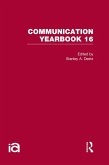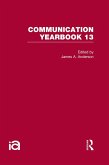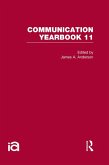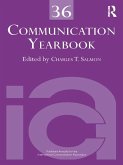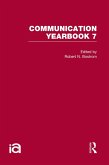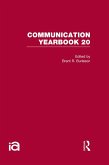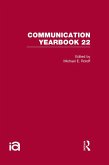Communication Yearbook 15 (eBook, PDF)
Redaktion: Deetz, Stanley
46,95 €
46,95 €
inkl. MwSt.
Sofort per Download lieferbar

23 °P sammeln
46,95 €
Als Download kaufen

46,95 €
inkl. MwSt.
Sofort per Download lieferbar

23 °P sammeln
Jetzt verschenken
Alle Infos zum eBook verschenken
46,95 €
inkl. MwSt.
Sofort per Download lieferbar
Alle Infos zum eBook verschenken

23 °P sammeln
Communication Yearbook 15 (eBook, PDF)
Redaktion: Deetz, Stanley
- Format: PDF
- Merkliste
- Auf die Merkliste
- Bewerten Bewerten
- Teilen
- Produkt teilen
- Produkterinnerung
- Produkterinnerung

Bitte loggen Sie sich zunächst in Ihr Kundenkonto ein oder registrieren Sie sich bei
bücher.de, um das eBook-Abo tolino select nutzen zu können.
Hier können Sie sich einloggen
Hier können Sie sich einloggen
Sie sind bereits eingeloggt. Klicken Sie auf 2. tolino select Abo, um fortzufahren.

Bitte loggen Sie sich zunächst in Ihr Kundenkonto ein oder registrieren Sie sich bei bücher.de, um das eBook-Abo tolino select nutzen zu können.
The Communication Yearbook 15 focuses on cultural studies and the social production of maning in relation to mass media messages. Included are significant issues in persuasion, language and dominance and interpersonal communication.
- Geräte: PC
- mit Kopierschutz
- eBook Hilfe
- Größe: 16.52MB
Andere Kunden interessierten sich auch für
![Communication Yearbook 16 (eBook, PDF) Communication Yearbook 16 (eBook, PDF)]() Communication Yearbook 16 (eBook, PDF)46,95 €
Communication Yearbook 16 (eBook, PDF)46,95 €![Communication Yearbook 13 (eBook, PDF) Communication Yearbook 13 (eBook, PDF)]() Communication Yearbook 13 (eBook, PDF)46,95 €
Communication Yearbook 13 (eBook, PDF)46,95 €![Communication Yearbook 11 (eBook, PDF) Communication Yearbook 11 (eBook, PDF)]() Communication Yearbook 11 (eBook, PDF)46,95 €
Communication Yearbook 11 (eBook, PDF)46,95 €![Communication Yearbook 36 (eBook, PDF) Communication Yearbook 36 (eBook, PDF)]() Communication Yearbook 36 (eBook, PDF)46,95 €
Communication Yearbook 36 (eBook, PDF)46,95 €![Communication Yearbook 7 (eBook, PDF) Communication Yearbook 7 (eBook, PDF)]() Communication Yearbook 7 (eBook, PDF)46,95 €
Communication Yearbook 7 (eBook, PDF)46,95 €![Communication Yearbook 20 (eBook, PDF) Communication Yearbook 20 (eBook, PDF)]() Communication Yearbook 20 (eBook, PDF)46,95 €
Communication Yearbook 20 (eBook, PDF)46,95 €![Communication Yearbook 22 (eBook, PDF) Communication Yearbook 22 (eBook, PDF)]() Communication Yearbook 22 (eBook, PDF)46,95 €
Communication Yearbook 22 (eBook, PDF)46,95 €-
-
-
The Communication Yearbook 15 focuses on cultural studies and the social production of maning in relation to mass media messages. Included are significant issues in persuasion, language and dominance and interpersonal communication.
Dieser Download kann aus rechtlichen Gründen nur mit Rechnungsadresse in A, B, BG, CY, CZ, D, DK, EW, E, FIN, F, GR, HR, H, IRL, I, LT, L, LR, M, NL, PL, P, R, S, SLO, SK ausgeliefert werden.
Produktdetails
- Produktdetails
- Verlag: Taylor & Francis
- Seitenzahl: 704
- Erscheinungstermin: 23. Mai 2012
- Englisch
- ISBN-13: 9781135148317
- Artikelnr.: 38253153
- Verlag: Taylor & Francis
- Seitenzahl: 704
- Erscheinungstermin: 23. Mai 2012
- Englisch
- ISBN-13: 9781135148317
- Artikelnr.: 38253153
- Herstellerkennzeichnung Die Herstellerinformationen sind derzeit nicht verfügbar.
Stanley Deetz
Mass Entertainment, Audience Mediation, and Politics; 1: Mass Entertainment
and Community: Toward a Culture-Centered Paradigm for Mass Communication
Research; The Challenge of a Culture-Centered Paradigm: Metatheory and
Reconciliation in Media Research; Some Good News-Bad News About a
Culture-Centered Paradigm; 2: The Resourceful Reader: Interpreting
Television Characters and Narratives; The Active Viewer and the Problem of
Interpretation: Reconciling Traditional and Critical Research; At the
Intersection of Messages and Receivers: Enriching Communication Theory; 3:
Schema Theory and Measurement in Mass Communication Research: Theoretical
and Methodological Issues in News Information Processing; A Broader and
"Warmer" Approach to Schema Theory; 4: Insights into Soviet Life Provided
by Soviet Movies: Political Actors and Their Ideologies in the 1970s and
1980s; Politics and Aesthetics in the Cinema of Postrevolutionary
Societies; Mass Media Messages and Influence; 5: Encounters with the
Television Image: Thirty Years of Encoding Research; Closer Encounters with
Television: Incorporating the Medium; Cultural Studies and the Politics of
Encoding Research; 6: A Theory of Belief, Attitude, Intention, and Behavior
Extended to the Domain of Corrective Advertising; Deception,
Accountability, and Theoretical Refinement; Effects and Effectiveness of
Corrective Advertising: Assumptions and Errors in Regulation Research; 7:
Bridging Theory and Praxis: Reexamining Public Health Communication;
Bridging Theory "of" and Theory "for" Communication Campaigns: An Essay on
Ideology and Public Policy; Risk Communication: An Emerging Area of Health
Communication Research; 8: Public Issues and Argumentation Structures: An
Approach to the Study of the Contents of Media Agenda-Setting; Public
Issues, Agenda-Setting, and Argument: A Theoretical Perspective; The
Mediacentric Agenda of Agenda-Setting Research: Eclipse of the Public
Sphere; Interaction in the Social Context; 9: Dominance-Seeking Language
Strategies: Please Eat the Floor, Dogbreath, or I'll Rip Your Lungs Out,
Okay?; Thoughts About Floors Not Eaten, Lungs Ripped, and Breathless Dogs:
Issues in Language and Dominance; Gender and Dominance; 10: Communication
as the Interface Between Couples and Culture; Close Relationships in the
Physical and Social World: Dialectical and Transactional Analyses;
Communication, Intimacy, and the Course of Time; 11: The Politics of Common
Sense: Articulation Theory and Critical Communication Studies;
Communication, Postmodernism, and the Politics of Common Sense; The
Politics of Articulation and Critical Communication Theory; The Person in
Interaction; 12: Intrapersonal Communication: A Review and Critique;
Theoretical Choices That Clarify the Present and Define the Future;
Criteria for Evaluating Models of Intrapersonal Communication Processes
and Community: Toward a Culture-Centered Paradigm for Mass Communication
Research; The Challenge of a Culture-Centered Paradigm: Metatheory and
Reconciliation in Media Research; Some Good News-Bad News About a
Culture-Centered Paradigm; 2: The Resourceful Reader: Interpreting
Television Characters and Narratives; The Active Viewer and the Problem of
Interpretation: Reconciling Traditional and Critical Research; At the
Intersection of Messages and Receivers: Enriching Communication Theory; 3:
Schema Theory and Measurement in Mass Communication Research: Theoretical
and Methodological Issues in News Information Processing; A Broader and
"Warmer" Approach to Schema Theory; 4: Insights into Soviet Life Provided
by Soviet Movies: Political Actors and Their Ideologies in the 1970s and
1980s; Politics and Aesthetics in the Cinema of Postrevolutionary
Societies; Mass Media Messages and Influence; 5: Encounters with the
Television Image: Thirty Years of Encoding Research; Closer Encounters with
Television: Incorporating the Medium; Cultural Studies and the Politics of
Encoding Research; 6: A Theory of Belief, Attitude, Intention, and Behavior
Extended to the Domain of Corrective Advertising; Deception,
Accountability, and Theoretical Refinement; Effects and Effectiveness of
Corrective Advertising: Assumptions and Errors in Regulation Research; 7:
Bridging Theory and Praxis: Reexamining Public Health Communication;
Bridging Theory "of" and Theory "for" Communication Campaigns: An Essay on
Ideology and Public Policy; Risk Communication: An Emerging Area of Health
Communication Research; 8: Public Issues and Argumentation Structures: An
Approach to the Study of the Contents of Media Agenda-Setting; Public
Issues, Agenda-Setting, and Argument: A Theoretical Perspective; The
Mediacentric Agenda of Agenda-Setting Research: Eclipse of the Public
Sphere; Interaction in the Social Context; 9: Dominance-Seeking Language
Strategies: Please Eat the Floor, Dogbreath, or I'll Rip Your Lungs Out,
Okay?; Thoughts About Floors Not Eaten, Lungs Ripped, and Breathless Dogs:
Issues in Language and Dominance; Gender and Dominance; 10: Communication
as the Interface Between Couples and Culture; Close Relationships in the
Physical and Social World: Dialectical and Transactional Analyses;
Communication, Intimacy, and the Course of Time; 11: The Politics of Common
Sense: Articulation Theory and Critical Communication Studies;
Communication, Postmodernism, and the Politics of Common Sense; The
Politics of Articulation and Critical Communication Theory; The Person in
Interaction; 12: Intrapersonal Communication: A Review and Critique;
Theoretical Choices That Clarify the Present and Define the Future;
Criteria for Evaluating Models of Intrapersonal Communication Processes
Mass Entertainment, Audience Mediation, and Politics; 1: Mass Entertainment
and Community: Toward a Culture-Centered Paradigm for Mass Communication
Research; The Challenge of a Culture-Centered Paradigm: Metatheory and
Reconciliation in Media Research; Some Good News-Bad News About a
Culture-Centered Paradigm; 2: The Resourceful Reader: Interpreting
Television Characters and Narratives; The Active Viewer and the Problem of
Interpretation: Reconciling Traditional and Critical Research; At the
Intersection of Messages and Receivers: Enriching Communication Theory; 3:
Schema Theory and Measurement in Mass Communication Research: Theoretical
and Methodological Issues in News Information Processing; A Broader and
"Warmer" Approach to Schema Theory; 4: Insights into Soviet Life Provided
by Soviet Movies: Political Actors and Their Ideologies in the 1970s and
1980s; Politics and Aesthetics in the Cinema of Postrevolutionary
Societies; Mass Media Messages and Influence; 5: Encounters with the
Television Image: Thirty Years of Encoding Research; Closer Encounters with
Television: Incorporating the Medium; Cultural Studies and the Politics of
Encoding Research; 6: A Theory of Belief, Attitude, Intention, and Behavior
Extended to the Domain of Corrective Advertising; Deception,
Accountability, and Theoretical Refinement; Effects and Effectiveness of
Corrective Advertising: Assumptions and Errors in Regulation Research; 7:
Bridging Theory and Praxis: Reexamining Public Health Communication;
Bridging Theory "of" and Theory "for" Communication Campaigns: An Essay on
Ideology and Public Policy; Risk Communication: An Emerging Area of Health
Communication Research; 8: Public Issues and Argumentation Structures: An
Approach to the Study of the Contents of Media Agenda-Setting; Public
Issues, Agenda-Setting, and Argument: A Theoretical Perspective; The
Mediacentric Agenda of Agenda-Setting Research: Eclipse of the Public
Sphere; Interaction in the Social Context; 9: Dominance-Seeking Language
Strategies: Please Eat the Floor, Dogbreath, or I'll Rip Your Lungs Out,
Okay?; Thoughts About Floors Not Eaten, Lungs Ripped, and Breathless Dogs:
Issues in Language and Dominance; Gender and Dominance; 10: Communication
as the Interface Between Couples and Culture; Close Relationships in the
Physical and Social World: Dialectical and Transactional Analyses;
Communication, Intimacy, and the Course of Time; 11: The Politics of Common
Sense: Articulation Theory and Critical Communication Studies;
Communication, Postmodernism, and the Politics of Common Sense; The
Politics of Articulation and Critical Communication Theory; The Person in
Interaction; 12: Intrapersonal Communication: A Review and Critique;
Theoretical Choices That Clarify the Present and Define the Future;
Criteria for Evaluating Models of Intrapersonal Communication Processes
and Community: Toward a Culture-Centered Paradigm for Mass Communication
Research; The Challenge of a Culture-Centered Paradigm: Metatheory and
Reconciliation in Media Research; Some Good News-Bad News About a
Culture-Centered Paradigm; 2: The Resourceful Reader: Interpreting
Television Characters and Narratives; The Active Viewer and the Problem of
Interpretation: Reconciling Traditional and Critical Research; At the
Intersection of Messages and Receivers: Enriching Communication Theory; 3:
Schema Theory and Measurement in Mass Communication Research: Theoretical
and Methodological Issues in News Information Processing; A Broader and
"Warmer" Approach to Schema Theory; 4: Insights into Soviet Life Provided
by Soviet Movies: Political Actors and Their Ideologies in the 1970s and
1980s; Politics and Aesthetics in the Cinema of Postrevolutionary
Societies; Mass Media Messages and Influence; 5: Encounters with the
Television Image: Thirty Years of Encoding Research; Closer Encounters with
Television: Incorporating the Medium; Cultural Studies and the Politics of
Encoding Research; 6: A Theory of Belief, Attitude, Intention, and Behavior
Extended to the Domain of Corrective Advertising; Deception,
Accountability, and Theoretical Refinement; Effects and Effectiveness of
Corrective Advertising: Assumptions and Errors in Regulation Research; 7:
Bridging Theory and Praxis: Reexamining Public Health Communication;
Bridging Theory "of" and Theory "for" Communication Campaigns: An Essay on
Ideology and Public Policy; Risk Communication: An Emerging Area of Health
Communication Research; 8: Public Issues and Argumentation Structures: An
Approach to the Study of the Contents of Media Agenda-Setting; Public
Issues, Agenda-Setting, and Argument: A Theoretical Perspective; The
Mediacentric Agenda of Agenda-Setting Research: Eclipse of the Public
Sphere; Interaction in the Social Context; 9: Dominance-Seeking Language
Strategies: Please Eat the Floor, Dogbreath, or I'll Rip Your Lungs Out,
Okay?; Thoughts About Floors Not Eaten, Lungs Ripped, and Breathless Dogs:
Issues in Language and Dominance; Gender and Dominance; 10: Communication
as the Interface Between Couples and Culture; Close Relationships in the
Physical and Social World: Dialectical and Transactional Analyses;
Communication, Intimacy, and the Course of Time; 11: The Politics of Common
Sense: Articulation Theory and Critical Communication Studies;
Communication, Postmodernism, and the Politics of Common Sense; The
Politics of Articulation and Critical Communication Theory; The Person in
Interaction; 12: Intrapersonal Communication: A Review and Critique;
Theoretical Choices That Clarify the Present and Define the Future;
Criteria for Evaluating Models of Intrapersonal Communication Processes

